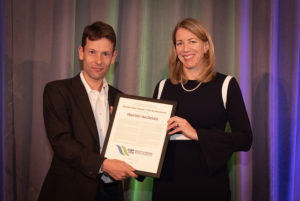March 8, 2019

In 2016, CSEP introduced the CSEP Mentorship award in honour of a long-standing and very dedicated CSEP Member, Dr. Enzo Cafarelli. Dr. Cafarelli was a mentor in every sense of the word and the award recognizes CSEP members who have provided leadership in the same spirit as Enzo did. In the past two years, CSEP has received over twenty nominations for this award, each illustrating the impact that mentors have had on our Certified, Academic and Student members.
Applauded by her students for her passion for teaching, guiding their careers, and leading by example, Dr. Maureen MacDonald was the recipient of the Enzo Cafarelli Mentorship award in October 2018. Dr. MacDonald shared what mentorship means to her and how it has shaped her career.
How has a mentor impacted your career and what made them stand out?
Oh where to start! After I won the award I sent emails to a few of my key mentors. I emailed my highschool basketball coach, Mike MacKay and told him thank you for being such an outstanding role model and for showing me what can be achieved with teamwork and hardwork. He was also a great example of investing time in something you are truly passionate about and making that a key focus in your life. I also emailed Dr. John Roscoe, my undergraduate thesis supervisor in the Department of Chemistry at Acadia University to thank him for showing me how taking the time to mentor an individual student can change the path of their career and life. The lessons I learned very early on at Acadia certainly shaped the way in which I approach mentorship of all the trainees in my lab.
Finally I emailed Dr. Richard Hughson, a Professor in the Department of Kinesiology at the University of Waterloo who was my Masters and Doctoral thesis supervisor. Having Rich as a supervisor showed me an example of a life in academics that I thought aligned with my values and goals. Rich came to the lab almost every day on his way for a run with colleagues, he left work at 3:30 to pick his kids up from school, he loved the chance to get back in the lab and help us collect data and he was ALWAYS excited to talk about your results.
Why do you think mentorship is important?
I think that it is important to not lose sight of the fact that students are the heart of the university. Most people would not perceive this about me, but I am a fairly introverted individual and while I have enjoyed many aspects of teaching at McMaster, the most rewarding type of teaching for me is one-on-one mentorship with my students. I love seeing the student’s progress in all aspects through the variety of challenges, experiences and interactions they have and feel privileged to be a small part of that.
What does it mean to you for your students to recognize you as a mentor and nominate you for the CSEP mentorship award?
Reading the nomination letter from my students and trainees was such a wonderful experience for me. Of course, it was nice to read about all of the nice things they had to say about me, but what mattered even more was that they were putting into practice one of the core values we talk about in my lab. We often talk about how important it is to celebrate and facilitate the achievements of others and to remember that while a competitive spirit is very important, it is strong relationships with others that really matter in life. The fact that my trainees took the time out of their very busy lives to coordinate the submission of that nomination letter lets me know that they really believe in creating that sense of community.
What do you do to foster a strong mentee and mentor relationship?
 First and foremost, I try to remember what it felt like to be a mentee, specifically a graduate student. I remember how nervous I was to mess up an experiment. How I never felt like what I had written was quite ready for my supervisor to review. I remember how nervous to meet with them and I remember how much I appreciated all of the little things that helped me to know them better and understand what they were passionate about. These days, the biggest frustration I have is that I have very little time for “drop in” conversations. It seems that my life revolves around my calendar and so when I get a chance to meet with my mentees, I try to make sure I slow down and really listen to them so that I can facilitate their goals and aspirations rather than just check something off my list. I am not sure if I achieve this every day… but I certainly try. This past summer I hosted a “cardiac themed paint party” with my lab and the smiles on their faces tell the whole story about how taking time for those types of events matters so much!
First and foremost, I try to remember what it felt like to be a mentee, specifically a graduate student. I remember how nervous I was to mess up an experiment. How I never felt like what I had written was quite ready for my supervisor to review. I remember how nervous to meet with them and I remember how much I appreciated all of the little things that helped me to know them better and understand what they were passionate about. These days, the biggest frustration I have is that I have very little time for “drop in” conversations. It seems that my life revolves around my calendar and so when I get a chance to meet with my mentees, I try to make sure I slow down and really listen to them so that I can facilitate their goals and aspirations rather than just check something off my list. I am not sure if I achieve this every day… but I certainly try. This past summer I hosted a “cardiac themed paint party” with my lab and the smiles on their faces tell the whole story about how taking time for those types of events matters so much!





